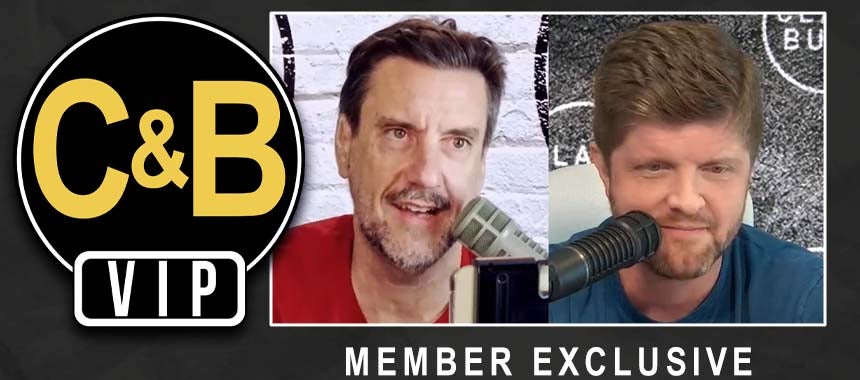Andy McCarthy on Durham’s Big Mistake in the Sussmann Trial
1 Jun 2022
CLAY: We’ll ask Andy McCarthy. Let me start with that question. Have you paid any attention at all to the Johnny Depp, Amber Tur — Heard trial? Are you surprised…? I said, “Amber Turd,” which is what she trended with sometimes.
BUCK: (laughing)
CLAY: That gives you an idea how much attention I paid to this. Are you surprised, Andy, that people cared as much about a defamation trial in Northern Virginia? Or are you utterly disgusted that I even asked you as a legal expert your opinion on this case?
MCCARTHY: (laughing) You know, look, what energy I spent on this has been to try to, like, avoid any encounters with it.
CLAY: Yeah.
MCCARTHY: But I have a sort of a personal take on this because I tried one of the one of the great federal criminal trials in at least modern American history in the terrorism case in the 1990s. But federal trials are not on television, and every day that we are on trial in 1995, they had this little thing out in California called the OJ Simpson case.
CLAY: Oh, yeah.
MCCARTHY: We only had the future of the country and civilization. They had sex and drugs and race and —
BUCK: You were prosecuting the World Trade Center bombing ring and the Blind Sheikh, right, Andy wasn’t that the trial?
 MCCARTHY: That’s right. And the OJ Simpson case day for day was at the same time as we were, to the point where when we won the case, they wanted us on Nightline. They wanted us to come on and debate Lynne Stewart about the trial. And while we were arguing in the office about whether I should go on and do it — because the government only speaks in court. You know, we’re not supposed to go on Nightline. While we were having this argument in the office, we got a call. She said, “Never mind. Judge Ito says there’s a verdict.”
MCCARTHY: That’s right. And the OJ Simpson case day for day was at the same time as we were, to the point where when we won the case, they wanted us on Nightline. They wanted us to come on and debate Lynne Stewart about the trial. And while we were arguing in the office about whether I should go on and do it — because the government only speaks in court. You know, we’re not supposed to go on Nightline. While we were having this argument in the office, we got a call. She said, “Never mind. Judge Ito says there’s a verdict.”
BUCK: Oh!
MCCARTHY: (laughing) So, we never did it. They actually decided their case the day after we did. It was really extraordinary to have these two things going on at the same time. So, anyway, was that a long-winded way enough of avoiding answering your question about the case? (laughing)
CLAY: No. (laughing) I appreciate it. I’m genuinely curious how much of our audience has been paying close attention to it. I want to give you credit. We had you on, I think it was last week, right, Buck —
BUCK: Yeah.
CLAY: — and you basically nailed this Sussmann trial in general. Was there anything that surprised you about the results that came out?
MCCARTHY: The result doesn’t surprise me. I was a little surprised by the end at how weak Durham’s case was because when it got teed up for trial for us, he had the text —
CLAY: Yes.
MCCARTHY: — what we called “the smoking gun text.” But then you realized he didn’t have it when they indicted.
CLAY: Yep.
MCCARTHY: And it just made me wonder, you know, what made him think he was gonna be able to prove this? Let’s say the text never happened. How do you prove beyond a reasonable doubt what the statement was? You know, before you got to the, like —
 CLAY: Sorry to cut you off there. For our audience that may not know what you’re talking about with the text, can you explain? ‘Cause I do think that’s really significant and it’s kind of complicated why that wasn’t a part of the indictment of a criminal defense.
CLAY: Sorry to cut you off there. For our audience that may not know what you’re talking about with the text, can you explain? ‘Cause I do think that’s really significant and it’s kind of complicated why that wasn’t a part of the indictment of a criminal defense.
MCCARTHY: Yeah. So, he indicts… The meeting that happened between Sussmann and the FBI, Jim Baker, who was then the general counsel, happened on September 19th, 2016, and most federal crimes have a five-year statute of limitations, including false statements. So he had to indict by September 19, 2021, and he did it like flush-up against the statute of limitations.
And then months later, in March — about six weeks before trial — while he’s preparing Baker to testify, he says to him, “You know, look, if you have any records, anything that you’re hoarding that is relevant to the case, we need that so we can turn it over to the defense,” and Baker went back and checked in the cloud his old text messages and found all these messages from Sussmann, including the text message in question.
So the problem that Durham had is ordinarily, if you get new evidence, that’s like, I mean, this evidence was perfect for Durham in the sense that it’s a flat-out statement not relying on Baker’s memory but a flat-out statement from Sussmann that says, “I’m not representing a client, I’m just coming from the FBI ’cause I want to help the Bureau, concern about the country,” you know, all that good stuff.
So ordinarily if you’ve got something that was that incriminating, as a prosecutor you would just toodle back into the grand jury and supersede the indictment, add new charges or tighten up the charges you had. Because he couldn’t do that because the statute of limitations had already run. So if he had even substantially changed the indictment, he risked losing the whole count, losing the case.
So they were able to use it. They were able to put the text in as evidence that probably Sussmann said what Baker said he said at the meeting, but the jury was told they couldn’t convict based on the text. They had to convict based on whether they found that he made the statement at the meeting or not.
BUCK: So wow. I mean, this is amazing, Andy, ’cause obviously the Democrat-aligned media yesterday, CNN was just, “Not guilty! Big victory for justice!” you know the whole thing. You’re just telling us that this essentially came down to timing and the bureaucratic machinery that was at work in the prosecution. I mean, it was kind of a… It was just a technicality, really?
From February: Welcome to the Swamp, Mr. Durham … https://t.co/r1sWR8cQRv
— Andy McCarthy (@AndrewCMcCarthy) June 1, 2022
MCCARTHY: Yeah. Well, Buck, I think that’s a big part of it, as far as like, the strength of his case is concerned. I think he could have gotten over that hurdle because it make sense to me to conclude that why would Sussmann have said something different at the meeting when you have the text right before the meeting and you have these statements he made to the other FBI officials right after the meeting that are consistent with the idea that Sussmann came in and said he wasn’t representing a client.
So I think he could have been gotten past that hurdle, although it’s a tougher case than you would think from the text. To me, the big problem in this case is, you have to decide going in what was the role of the FBI here. And his theory, Durham’s, is that the FBI is a dupe. And I think those of us who followed this Russiagate stuff for years think that it’s a lot more complicated than that and that the FBI was more of a willing, complicit participant in this than somebody who was fooled or an agency that was fooled.
CLAY: Okay. Andy, let’s say… You’ve done these cases for a long time. Let’s say Durham had gotten a conviction. Does it change anything going forward? Because, as you pointed out, the statute of limitations issue, now that we’re into 2022, a lot of these charges related to the 2016 campaign would be virtually impossible to bring. Is there something more to come? Was the at least admission from Robby Mook, Hillary Clinton’s campaign manager, that she had been involved in forwarding this false information, the most impactful? Where do we go from here as it pertains to Durham’s investigation?
MCCARTHY: You know, Clay, he’s got this other trial that’s coming up in October.
MCCARTHY: He’s gotta try the guy Danchenko, who was the source of the Steele dossier. And that’s another case where he’s saying the FBI was duped, right. The charge is lying to the FBI. So immediately we know that’s the next legal thing that has to happen. As far as, like, the final outcome here, I’ve always thought that the reason that Attorney General Barr made Durham a special counsel — as opposed to just like the federal prosecutor from Connecticut who was assigned to do this case — is he wanted them to be able to write a narrative report at the end just like Mueller was able to do.
Ordinary prosecutors don’t get to do that. If you can’t charge, you just close the case and move on to the next case. Special counsel gets to write a report, and I think Barr probably knew or suspected that a lot of what happened here, while icky, is not necessarily illegal, and the best hope is that you get political accountability for what actually happened here and what the Clinton campaign did. Now, I’d like to see…
I think what makes this scandalous is the idea that the government agencies were put in the service of partisan politics. And I’m leery about what the report ultimately is gonna say if it’s gonna essentially exculpate the FBI and the government at large as a participant in this, because I think what really made this scandalous was that the government was in cahoots with the Clinton campaign.
BUCK: That’s where the real collusion was, Andy: The government working with the Clinton campaign and the media. We’re speaking to Andy McCarthy of National Review, Fox News contributor and legal expert. And, Andy, I will not ask you to opine on the latest revelations about Hunter Biden. We already asked you about the Amber Heard, Johnny Depp trial. So we’re taking you in that direction.
MCCARTHY: (laughing)
BUCK: If anyone, Clay and I might talk about a little bit later on in the hour. It’s almost… I can’t even read some of this stuff on the air that are in the headlines about Hunter Biden. But I’m just wondering if you think, given what we’ve seen here with a jury that looks like they didn’t want to — or, you know, it was unlikely they would convict because of the politics around the Sussmann trial. The politics around even prosecuting the sitting president’s son, who is clearly a walking catastrophe, legal risk, et cetera, how do you think that shakes out? Clay and I have an important bet on this.
MCCARTHY: You know, Buck, it was an important development last week, but with everything going on, I think it really went under the radar, which is one of the assets that’s being investigated in the Hunter Biden investigation is this Blue Star Strategies, which is this Clinton-connected consulting firm that Hunter brought in to lobby the Obama administration on behalf of Burisma, which is this Ukrainian company that he was on the payroll at, right?

So quietly what the U.S. attorney did in that case was about five days earlier, they were told that they had to register as a foreign agent. In other words, they didn’t prosecute them; they said (audio drops) and these guys as a result went in and, you know, filed what they should have filed in the first place saying that they had been a foreign agent. And then five days later, they quietly dropped the case.
And I thought that was interesting because what they’ve been saying about Hunter is that they’re looking at not only at his taxes but at whether he violated the foreign agent laws and that could lead to money laundering, because if the money is illegal when he got it and it changed its form formulates, that could be money laundering. So if they decided to punt on Blue Star Strategies, it suggests to me that the foreign agent part of the case is collapsing.
And what I’ve always felt would probably end up happening with Hunter is, after all this — you know, this big win — what would end up happening, justice would take like a minor tax plea from him or maybe even a civil settlement where he gets to pay a fine. And that way, Biden can say he didn’t interfere with the investigation; DOJ can say, “Look at how brave we are! We went after the president’s son,” but, in the meantime, nobody’s gonna care about the case because Hunter’s tax issues are the least interesting aspect of what went on in that investigation.
CLAY: Yeah. By the way, that means that you would like to take the side of Buck Sexton in our great steak debate, based on that analysis. Andy, one last question for you. You talked about these text messages being found after the statute of limitations had already occurred and the charges had already been brought against Sussmann. Why in the world were these text messages not found until then?
MCCARTHY: Yes.
CLAY: Because if they had had these text messages, is there anything nefarious from your perspective? Like you suddenly go on the cloud and you’re the FBI and you’re like, “Oh, here’s a text message where he directly admits that he was not representing someone while he was clearly representing the Clintons.” It’s in writing. It seems even with a Democrat jury in the city of Washington, D.C., there, this would have led to a conviction. And you may know the specifics. Why in the world was this not discovered in time to include as part of the indictment?
MCCARTHY: Yeah. You know, when you ask that, I keep thinking about… Remember that movie years and years ago Absence of Malice?
CLAY: Yeah.
MCCARTHY: They had Wilford Brimley, the prosecutor, comes in at the end and he says, “You know, wonderful thing a ‘subpoenie.’” Why didn’t they issue a subpoena to Baker? I don’t get that. I’ve heard that Durham… The story that’s been put out is that Durham was kind of derailed in part because of the inspector general’s investigation of various aspects of the way the FBI’s handled these cases.
I’ve never heard of a situation where a prosecutor, especially a special counsel who’s supposed to be quasi-independent of the Justice Department, has to wait to do anything before the inspector general is finished with his internal investigation. I don’t know why they couldn’t have just subpoenaed Baker, and it would have been in their interests to do that because you don’t rely on Baker’s goodwill.
I’m not taking a shot at Baker here, but you subpoena witnesses because it’s the government’s responsibility to gather the evidence. You don’t rely on their good faith in, like, figuring out what might be relevant to your investigation and then giving it to you out of the goodness of their heart. So I don’t understand why that stuff wasn’t subpoenaed.

CLAY: Yeah. And this is just me putting on my lawyer hat, so to speak. You’re obviously the expert here. If you had been prosecuting this case — and you obviously have a lot of experience in this — you bring the case. You realize that it’s a tenuous, difficult case potentially to prove beyond a reasonable doubt, and then this text message gets dropped in your lap but you are no longer able to use it as a part of the criminal indictment based on the timing, what would your reaction have been?
MCCARTHY: Well, you know, it’s a tough question to answer because you have to… You know, the premise is that you would have indicted the case on the strength of the evidence without the text. Let’s put it this way: I would have been very angry to find out about that at a late stage. But I would have been kicking myself if I could have… I mean, look, Durham’s had this investigation since 2019.
CLAY: Yeah.
MCCARTHY: I don’t know of any reason why he couldn’t subpoena documents from everybody who he needed to subpoena documents from.
CLAY: It’s a great answer, great question. You’re always fantastic. You know, maybe we need to have you back for the Amber Heard-Johnny Depp trial when it’s over.
BUCK: (laughing)
MCCARTHY: No! No! No! No! (laughing)
CLAY: That is Andy McCarthy. Encourage you to go follow him on Twitter. He really is fantastic breaking down all this stuff. Know how busy you are. Thanks for coming on.
MCCARTHY: Thanks, guys.
Recent Stories
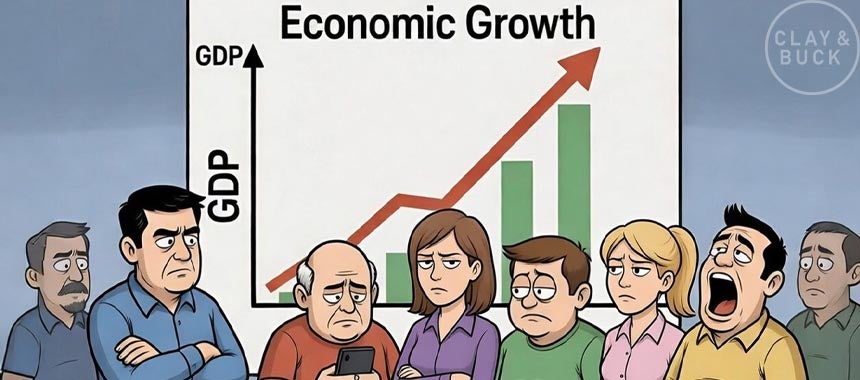
More Great Economic Data Comes In, But Will Voters Feel It by November?
Will Americans feel this in their own lives in time for the midterms?
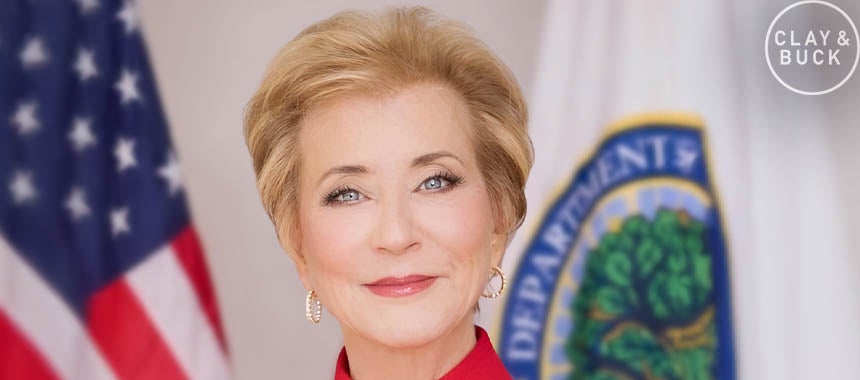
Education Secretary Linda McMahon Announces the Presidential 1776 Award
Clay and Buck talk education innovation with the secretary.
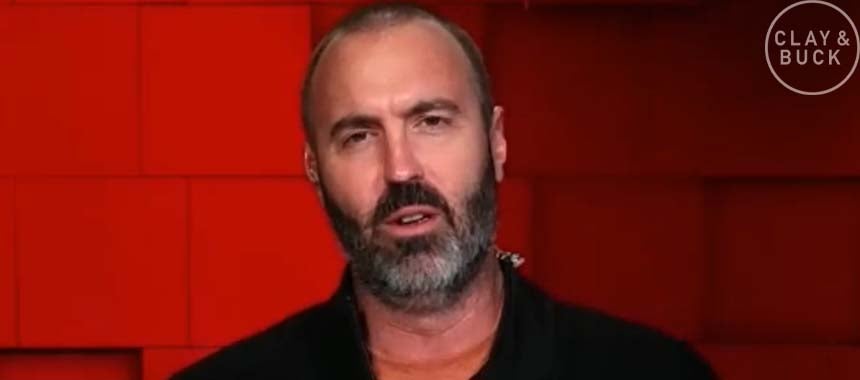
Jesse Kelly Discusses His New FREE Book -- and Other Masculine Topics
Our old pal, Jesse Kelly, syndicated radio show, host joins Clay & Buck with a special announcement.
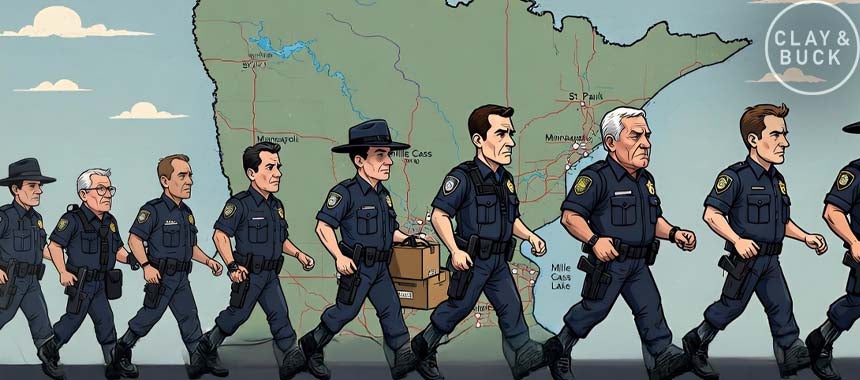
ICE Pulls Back? Dems Cooperate with Homan? What's Really Going on in Minnesota
The guys sort through the news out of Minnesota.





